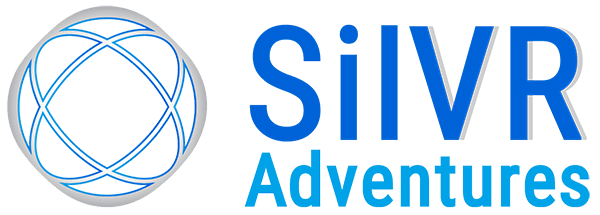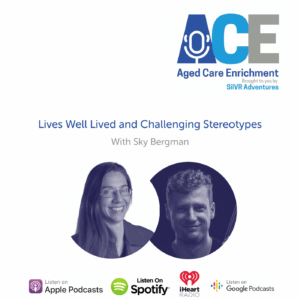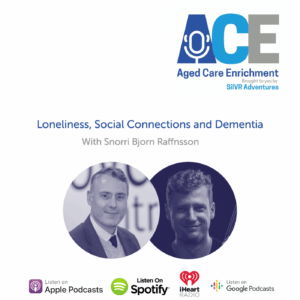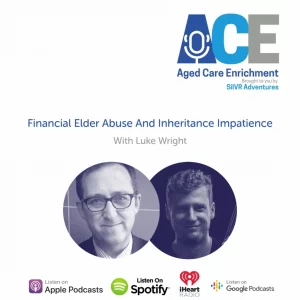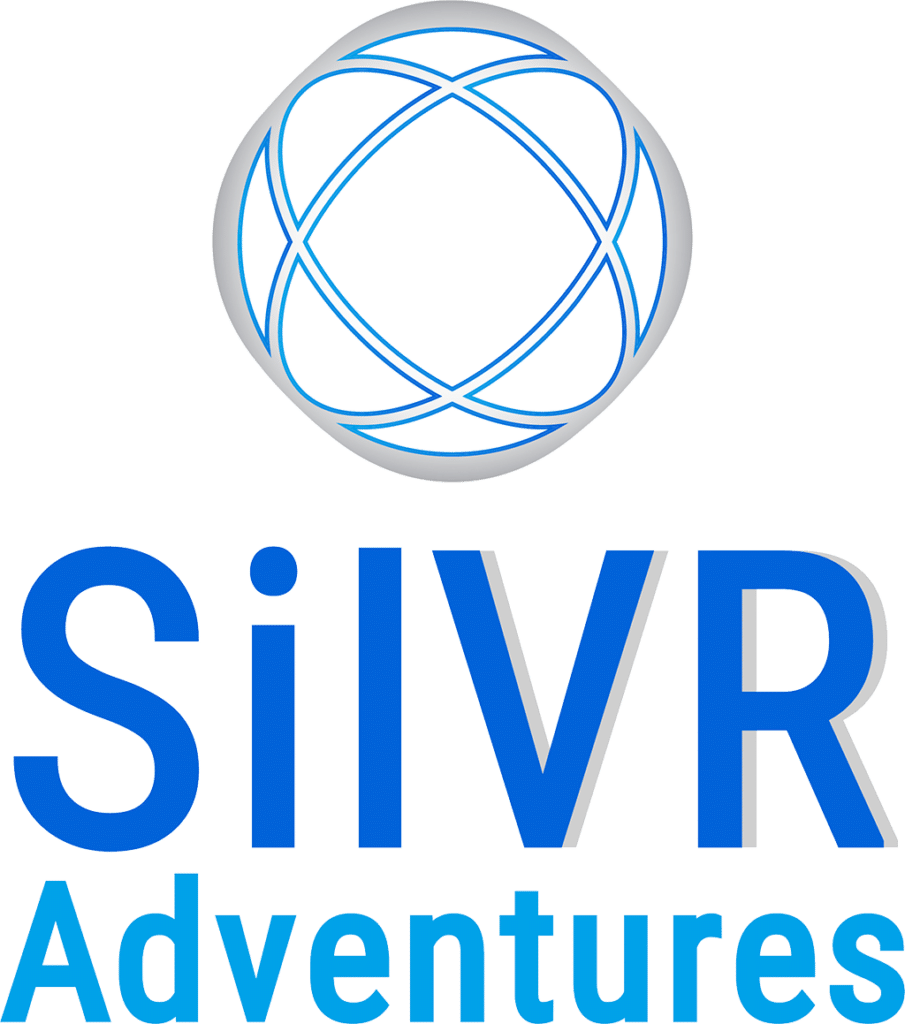Angela Burton is the creator of the Feet to the Fire Writers Workshops, a writing program that encourages older adults to share and relive their stories and memories through the process of writing. What began as a social writing group for all ages in her house, soon developed into a tailored program for seniors both in residential care and their own homes.
Through creative prompts and a combination of encouragement and accountability, Angela helps seniors to reconnect with their past through writing. But she’s quick to clarify that it’s not about writing your memoir, instead writing small snippets or episodes from your life.
The topic of creativity and writing opens up a bigger discussion about the role of creativity in everyone’s lives, regardless of age or cognitive ability. And that perhaps it doesn’t matter what you make as long as you’re making something.
This episode also features a excerpt from Angela’s podcast the Feet to the Fire Writer’s Workshops OUTLOUD, where Angela invites participants in her program to chat and share a selection of their writing.
Transcript
Ash de Neef: Angela thanks for joining us on the program today.
Angela Burton: Thank you so much for having me
Ash de Neef: And for our listeners who don’t know who you are, could you give us a bit of your background and why you’re joining us today?
Angela Burton: Yeah. So I am from Louisville Kentucky and I have a company called Feet to the Fire Writers Workshops. Which is essentially a program that we developed for older adults, and it’s expressive writing.
So it started out as a way to help people capture their life stories, their legacy – and they do that. But it’s also a very important part in a therapeutic way for people to just express themselves through words. And we all have the ability to do that, we just have to tap into it.
So that’s essentially what we do It’s very simple but we also have a creative knack that we go about helping people write their stories down.
Ash de Neef: Fantastic and how did you get involved in this work This is your company but how did you start – where did you get the ideas from is what I’m trying to understand ?
Angela Burton: Yeah it’s a good question, and it’s one we get really often.
It came out of a place of me being very dissatisfied with what I was doing in my life first of all. I had just turned 50 and I wanted like people around me who were my tribe, who enjoyed writing.
I was also rather influenced by my father who had written quite a lot as he got older. He had a business and he retired and he became fairly just depressed and lost. His business was his identity.
So he had shown me and I didn’t realise what was happening until fast forward several years later, but he was showing me how important the process of writing was to him in finding closure with aspects of his life. He was writing about his childhood and his young adulthood and he was writing about last week, and he was just expressing himself. So that was totally an influence, and then there was my own unhappiness with where I was at that point in my life.
So it came from two places and it also came from a place of my whole being is about writing. I’ve been writing since I was a child I studied English in my undergraduate degree, and then I got an MFA in creative writing in my graduate degree. So I’ve been writing all my life, and I had also teaching most of my adult life.
So I had those skills, I had that natural tendency to be able to guide and lead people and facilitate groups. So I decided I wanted to create a very special experience that was not a classroom experience. That would help to inspire people to write, to guide them in writing, to not teach them how to write because it’s not about that.
And I just decided I was going to start it in my living room. And I think I had $50 and I bought a URL. And I did a lot of things just very ragtag at the beginning because I was just seeing what would happen. But I created essentially a workshop in my living room. And I had a fireplace and I felt it was really important that, it was October at the time. I felt it was important that a fire was a metaphor for lots of things.
It has to do with we’ve all told stories around the fire for aeons and centuries, and fire draws people together. It’s warm, it’s kind, it’s encapsulating.
And it was really interesting because I started having literal strangers sign up for these workshops and come into my living room week after week after week. My kids thought I was crazy. They were like, “mom what are you doing?” And I said, “I’m doing something that I feel like I absolutely am supposed to be doing.”
And I didn’t have a vision that it was going to be writing workshops for older adults I didn’t know that yet, I was just doing this thing that felt very natural to me. And that was to bring people together, to form friendships to support each other and to get people writing. Because I knew it was a really good thing to do.
Ash de Neef: Wow so at the start that you must have had some sense of the value of writing from your father’s experience and your experience. Knowing that you were going to tap into some stuff that was buried.
Angela Burton: Oh absolutely. You never know what you’re going to get when you write that’s the fun part of it, It’s like a surprise. I often like to liken writing to watching a movie, you don’t know what’s coming next. And it’s true when you’re writing you don’t know what’s going to come out of your fingertips next.
I think that there’s a lot of value for people in writing about their own experiences because you are the authority on you. So I felt like what I was able to bring to the table and offer people was the encouragement, the accountability – people want accountability often when they write.
And I when I named the workshop, the Feet to the Fire Writers Workshops it was for those reasons you hold your feet to the fire it’s an expression it’s an idiom. And people want that. And and it caught on just like fire. It caught on and the metaphors keep coming and nothing has gone up in smoke yet. So we’re good.
Ash de Neef: And something that strikes me about the early days of the project would have been it’s in your living room the sense of community that’s building through that. What was that like at the start?
Angela Burton: Yeah so, mostly when it would be the beginning of a workshop usually they would run six or eight weeks or so. And it was small so we didn’t have a bunch of people. Nobody knew each other. People would walk in utter strangers, I didn’t know them.
And the first thing is they’d have to be uncomfortable, and be okay with being uncomfortable at first. And then get comfortable as time passed.
And so by the end of you know six or eight weeks they had formed these bonds with each other because they started to know each other And so that was like one of the best things that I saw early on were these friendships happening, because they would carry on outside and beyond the workshop.
And I thought this is really special. This is powerful stuff. Because I think when you have a support system, when you’re all trying to work toward a common goal which for us was writing you find that you have commonalities with other people and that’s just very human. So I think that’s one of the main strengths of this particular program. And I know that it’s actually a strength for older people in retirement and senior living communities for sure, because they find fellowship with each other.
And you can do that around lots of things I mean you can do that around art projects and music pursuits and all kinds of artistic pursuits, writing is no different. And I think I saw it really fast and then I just kinda kept encouraging it to happen. And I can’t explain to you why it worked I think it was very serendipity stuff mostly. The right people would weirdly come together in the right groups and get along and like each other and enjoy each other’s company. It was magical. It is magical. That’s the stuff I can’t explain
Ash de Neef: Yeah that’s the best stuff right?
Angela Burton: Yeah it really is. It’s certainly what kept me going. Because once I started doing that and hosting these groups I would watch magic happen in my living room. They would leave and I would close the door and I would clean up everything. But I would be cleaning my house up and turning out the lights and I would feel like something weirdly spiritual had happened in my living. And I don’t mean to be like woo-woo but it was just really interesting and special.
I did it for several years before I even turned it into a curriculum and an actual program that I could help other people learn to do and use. So there was a lot of if you want to think of it, I guess I had focus groups right in front of me for years but yeah.
Ash de Neef: Yeah That’s awesome. And now you’ve transitioned the business into focusing more on older adults and I’m sure working in lots of residential care facilities.
Something that I can see might become more important to people who are in retirement living is this word of legacy this idea of leaving something behind. What do you think people are really looking for when they’re writing for their legacy?
Angela Burton: Okay It’s a great question. Because when I once I started those groups in my living room, my mom who was very much alive decided she wanted to join one of my groups. And this is how it all started to evolve into older adults because my mom was 84 I think at the time.
And she experienced this process, and then she said, “I think you should think about taking this to people like me.” And I said, “what are you talking about?” And she said, “old people.” And I said, “you’re not old, like I don’t ever think of you as old.” She’s about to turn 91 now.
So between my father having done it and had died and left us all these stories, and my mother then trying to take a go at it and realizing it was useful it made sense.
So I thought I can’t invite older people to my living room. So I had to figure out a way to go out and do the workshop in a retirement community. So that’s what I started to do, and that’s how I made the transition into trying it out with older adults.
So I found a retirement community here in Louisville I called them up I set a meeting. It turns out lots of retirement communities want something like this but I didn’t know that at the time. And I started with my very first group there.
And the oldest person in that group was 97, the youngest was probably in his or her late sixties And I thought of it as legacy. That’s what I was aiming for I thought, “oh this is great We’re going to help people write their life stories and call it a day. It’s great. It’s legacy.” But it’s so much more than legacy.
Yes, they get stories that they leave behind people that write stories If they want to leave them behind they can leave them behind. But it’s more for me about the process that people experience while they’re doing it. Because it’s so like absolutely healing in so many ways, it allows people this incredible self-expression that we all need no matter what our age. But I think especially in our later years when we’re able to look back at our life, It’s so incredibly useful.
So I was getting to witness this and then my idea shifted from – okay legacy is the icing on the cake right It is. It’s the process that they’re going through that’s the real meat of the journey. And that then became what I focused in on. How do I make that experience really as perfect as I can for people so that they adopt it, they hold onto it and they want to keep going with it? Because quite frankly, we never run out of stories.
Ash de Neef: So moving into residential facilities I’m sure you would have started working with people who were quite reluctant to write. Which would have been a change from when you had people knocking on your door literally.
How have you found encouraging these people who have no experience in writing and might be a little bit scared of it?
Angela Burton: Oh absolutely. People are terrified to try something, new period. But on the other hand the way that I would do it you know initially is I would go and I would pitch to groups of older people. It was just me and I would walk in and say, “hi you don’t know me but I’m going to try to encourage you to write some stories. “
And I think the thing that works for Feet to the Fire that we’ve found is really successful in our program, is that we don’t advertise this as writing your memoir. Because that is a daunting feeling. If you think you’re going to have to write your whole life you’re not gonna do it. Like you’re gonna run the other way.
So we decided that the way that we would approach things is we’re just gonna go for snippets. We’re just gonna write and we have a very creative specific and interesting and cool set of prompts that we use. And they change all the time with different versions – That’s our secret sauce.
And so we’re not asking people traditional questions about their life. We’re giving them really odd kinds of things to write about and then they write these stories that are just beyond anything we could imagine.
So initially yes, people might be a little bit reticent a little bit hesitant. But the way I look at it is they wouldn’t show up if they weren’t curious. And so it’s totally a self-identifying kind of a program. Nobody’s forced into this program, people are asked if they would like to participate. And if they do want to participate, they come into the group because they’re curious. Once they’re in and they get the hang of it they get hooked on writing.
It’s interesting I’ve seen people time and time again we’ve worked with literally hundreds and hundreds of people. The people that stay with it are the ones that get hooked on the process because it’s so fulfilling.
So yes curiosity and self identifying that maybe they want to try something new, but there’s always a little bit of hesitancy. But we get past that really quickly because of our process and the way that we approach it.
There’s no workbooks. There’s no fill in the blank, it’s very adult. The program is very much designed for adults because I didn’t want anything that was going to infantilise people. And I think that happens oftentimes in programs designed for older adults. So I thought, “what would I want if I were in my eighties or nineties?” I’d want something that was really intelligent. And really that was going to meet me where I feel like I am. So the trepidation is there but it goes away really quickly.
Ash de Neef: Can you tell us a bit about the podcast? The Feet to the Fire Writer’s Workshops Outloud.
Angela Burton: It’s a mouthful right?
Ash de Neef: It is it’s a long one.
Angela Burton: The podcast happened because of the pandemic. I found that here we were, this was you know about April of last year. So many retirement communities, senior living communities were literally like just on lockdown. And residents were shuttered into their rooms because of the pandemic.
And I got really worried for people because they’re in their rooms, they’re isolated, they’re lonesome, they’re not connecting. They could be writing their voices are so important, and just like you said it’s you have such a vibrant group of people that have such varied life experiences and histories that their voices become like gems to keep.
So I had no idea how to do a podcast. I literally had no clue. So I did what I do when I don’t know how to do something I reach out to people who do know how to do something like that. I had to figure out a way to help capture these voices. So that’s what happened and it’s a whole other medium, but it’s still the same process.
Like what we do in that podcast is we talk to them about the process of writing because they’ve been doing it. And then we have them share a story or two that they’ve written. But in doing so we’re capturing those voices for eternity in a digital format.
Not everybody wants to be on a podcast and they were very concerned and most people were like, “I don’t want my face on there.” And I’m like, “I don’t want faces either I want audio.”
Because I really believed that the sound of a voice to me is precious. I don’t know how many people have told me when they lose someone a parent, a grandparent, a sibling, a friend they save their voicemails. Because they don’t want to lose the sound of that voice.
And so to me the voice is everything – It’s just everything. And having them reading their own stories which is what they do in the workshop anyway, is really important. So it just made sense to do that, and then we developed virtual groups because that became the way to continue the program in a virtual way so that people could stay connected.
I hope I answered your question.
Ash de Neef: No you did. It’s great to know where it came from. And I really agree with you about this idea of audio and someone’s voice, it’s really powerful. I’ve got a couple of recordings from you know really pivotal moments in my teenage years and when I was a bit younger as well that I like to listen to. Just because of how transformative they are or how transportational you might say. I feel like I get brought back to that place even more vividly than the video can do for me.
Now I know that Angela you’ve you’ve got a snippet from the podcast from somebody’s story that we might be able to play on the episode. Can you give us a little bit of an intro to what listeners are about to hear?
Angela Burton: Yeah so the snippet that you’ll hear is a woman that came into one of our writing groups not having been a writer. You know that’s the interesting thing. I think people automatically want to assume that they have to be a writer in order to join a writer’s group, which couldn’t be further from the truth.
And that’s the first thing we clear up is that no we’re not going to try to publish, that’s not the goal. The goal is the process like you said and we’re just going to be in the process of writing. So let’s just kind of let go of that idea that we’re going to be a writer we’re just going to be writing.
So she came to the group because she was curious and her friends had encouraged her to join. Writing for her is something that she does now every day. She would say and she’s told me it’s gotten her through a lot of days during this pandemic when things have been really shut down. And it’s also something that she looks forward to because she never runs out of stories. She’s always inspired with more stories because she stays now in a virtual group with us.
And so she’s a person who wasn’t a writer who now loves writing. And it’s something that she knows she can do on her own and then share with others, and she gets a whole lot out of that.
She’s one of the most enthusiastic of our writers I could think of. There’s so many that we’ve had in the program, but she really loves it. And the piece that you’re going to listen to is about writing and it’s called An Ode to Writing. So it’s about her experience with writing and why she thinks it’s important.
And I think it’s very valuable
Ash de Neef: Excellent let’s have a listen.
Excerpt from the Feet to the Fire Writer’s Workshop OUTLOUD – Weezie Walker episode.
Ash de Neef: That’s fantastic Angela and people can hear more stories like this And from the writers themselves on the Feet to the Fire Writers Workshops Out Loud, which you can find I’m guessing anywhere you can find podcasts?
Angela Burton: Yes absolutely. The podcast has leached out into other countries now, you know – it’s happening to your as well right. And that’s yeah apple podcasts you’ve got them all, you can list them all.
Ash de Neef: Perfect. I wanted to return to something that you said and I know we’ve talked about it briefly, but it really aligns well with my thinking. For background’s sake I went to music college. My background is in music performance and that sort of stuff. And I remember one of the pieces of information that stuck with me throughout that education thing was that, it’s not really about what you make – It’s about making things.
And I can see no place where that’s more important than for those people who are a bit more vulnerable perhaps. People who have declining cognitive abilities and maybe aren’t going to be aware of the outcome of what they’ve made or be able to remember the process. But just to be actively engaged in an activity that is stimulating and nourishing. It’s really fantastic.
Angela Burton: Yeah absolutely. And we’ve had some folks in the program who are maybe early stage dementia, mid stage and still have their verbal abilities completely intact. And long-term memory hangs in there quite a bit.
And I’m always amazed because I when we designed this program I was not thinking Alzheimer’s. I was just thinking older people in retirement communities, independent living shame on me for not thinking broader. But as it turns out it’s very apt to use with people who have cognitive decline.
Because I’m seeing what we’re watching and what we’re getting reported back to us from the communities that are using the program is people are being like engaged right. And their memories are being exercised.
It’s a great cognitive exercise to write, just like music is. You use parts of your brain that you wouldn’t otherwise use. So yeah, there’s incredible value there to be able to be in the process of making something.
And it’s even more poignant if they do have memory decline and/or Alzheimer’s disease because they’re going to one day not be able to do this anymore. And so the time is of the essence right.
One of one of our communities told me the other day and this gave me goosebumps. But somebody told me that they had a gentlemen in their community who was in one part of the campus and his wife is in memory care because she has Alzheimer’s and she can no longer remember.
So he is on a quest to write their love stories while she’s still alive, and he’s doing it through the program
Ash de Neef: Yeah Wow
Angela Burton: That’s the kind of stuff that it happens like so often.
And when I was first running these workshops Ash I would go to four or five workshops in a day, at different communities different locations. And I would have like compassion fatigue by the end of the day, because I had heard so many stories so many lives so many personalities and I would just be like exhausted, but just thrilled too.
Because everybody’s so different and it really allows people this individuality, and talk about person centered care. This is so person centered. It’s all about the individual.
Ash de Neef: Yeah, awesome. Angela we’ve covered heaps and it’s been really great to look at how to use creativity and a creative process to enhance people’s lives. Is there anything else you wanted to chat about today before we we leave it there?
Angela Burton: I would just say that helping people to kind of just understand who they are at every stage of their life is really important. We do go through ages and stages and phases right, and we’re different when we’re 25 than we are when we’re 35 and 45 and 55 and 95.
The oldest person we’ve had in this program to date was 104, and he wrote some incredible stories and he said he had none but then he wrote them.
And I would say that the big thing that I hope people think about and take away is that, the ability that we have as human beings, up until virtually the day we die, to be able to engage in this process is incredible.
We’ve had people literally up until a week before they died writing their stories. They had started and they didn’t want to stop but they had to stop because their health was so declined that they were literally in their last stages of life.
So you know sometimes hospice will come to us. But unfortunately oftentimes in the United States with hospice I think the average I’ve heard is people will come eight days before death. And that’s like almost too late. Like they’re in the final active stages of dying. And it’s sort of like, if we just had six weeks prior or three months prior or time to work with people before they’re gone.
You don’t want to leave this life with regrets right. You don’t want to leave stones un-turned if you can do something about that and I think being able to write your story allows you to write your ending. And that’s how we look at it it’s important.
Ash de Neef: Fantastic. Angela thanks so much for your time today.
Angela Burton: Absolutely. Thank you so much having me.
